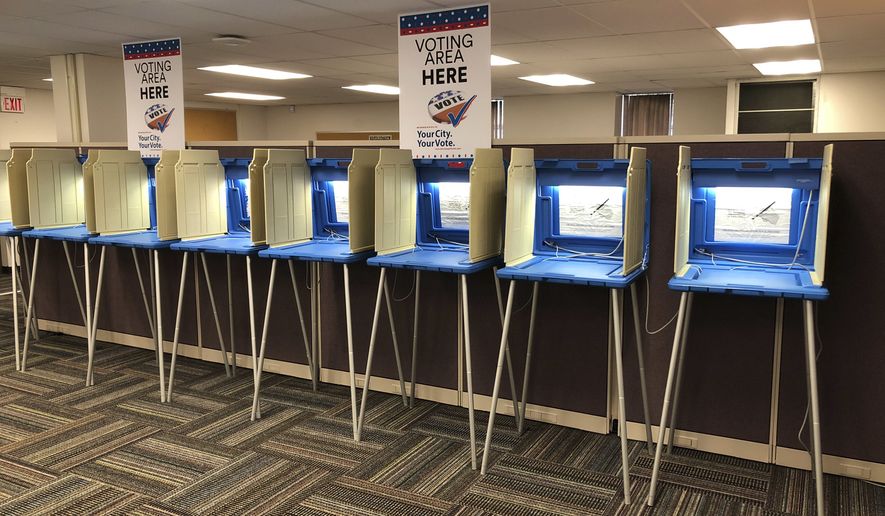Polls show the so-called “enthusiasm gap” among Democratic and Republican voters narrowing considerably since Justice Brett M. Kavanaugh’s confirmation hearings, but nothing was needed to jump-start Justin Kasieta.
Trekking the county along the southern shore of Lake Superior, the student at Marquette High School on Michigan’s Upper Peninsula has knocked on 12,000 doors and made more than 5,000 phone calls, according to state GOP officials.
And on this year’s Sept. 11 anniversary, his Teenage Republicans Club chapter planted 2,900 U.S. flags on the high school lawn to as a memorial for the victims.
“It’s about 45 degrees right now and it’s a downpour,” Mr. Kasieta said Wednesday afternoon as he set out on his canvassing rounds.
His determination may be atypical, but it does reflect what political operatives and experts say is an unusually engaged populace for a midterm election.
“I think we’re likely to see, for an off-year election, record turnouts of both Democrats and Republicans,” Senate Majority Leader Mitch McConnell predicted this week.
Winning elections depend on the three Ms — money, messaging and manpower.
The parties are each awash in cash — for the GOP the National Republican Committee has been raking it in, while for the Democrats, their candidates have been setting records.
“The truth is that the system is awash in money, both sides have plenty and more than they can efficiently spend,” said veteran political analyst Charles Cook of the Cook Report. “Nobody is going to capture or lose the House or Senate because of money.”
And polls show each party has an advantage on some issues: Democrats lead on health care, Republicans on the surging economy.
That means the personnel contest could be decisive.
In Michigan, where Mr. Kasieta’s labors heroically, party leaders say they’ve got their best operation ever.
“I do think that, as far as party apparatus goes, the Michigan GOP has a superior ground game to the Democrats,” said Sarah Anderson, the Republicans’ deputy chief of staff and communications director. “We have had over 2.3 million voter contacts for the cycle, have more than 2,000 unique volunteers making those contacts, and have far superior data to the Democrats.”
Indeed, it was an extraordinary “boots on the ground” effort by Republicans that delivered President Trump’s narrow victory in Michigan in 2016, one of three traditionally blue states that propelled him to the White House, she noted.
“Our ground game is one of the things that set us apart,” she said, pointing to the GOP’s reliance on volunteers, which she said was “a stark contrast to the Democrats who pay canvassers through unions and outside groups.”
It isn’t just 2016. President George W. Bush’s re-election victory in 2004 was credited to an innovative church-based get-out-the-vote effort in Ohio, which proved decisive. And President Obama’s re-election victory in 2012 was larger than expected, thanks to a massive edge in data and voter targeting.
Yet a ground game can only overcome so much headwind.
In Michigan, Democratic Sen. Debbie Stabenow leads GOP challenger John James, a West Point graduate and state businessman, by more than 17 percentage points in the current Real Clear Politics average of polls. And In the gubernatorial contest there, the RCP average shows Democrat Gretchen Whitmer holding nearly a 10-point lead over Republican Bill Schuette.
For volunteers like Mr. Kasieta, polls aren’t discouraging.
“The stakes really couldn’t be higher,” he said. “While some races may not look good in the polls right now, we sense a change since the Kavanaugh smearing, and we want to make sure about our local races.”
On the Democratic side, they’re looking to kick-start the hope-and-change coalition that powered Mr. Obama to two victories, relying on minorities, youths and women.
In Florida, for instance, party officials recently held a conference call with reporters to trumpet the money and manpower they have poured into Hispanic voter outreach this cycle.
More broadly, Democrats opened 40 “Winning Ticket” campaign offices, and held two-day training for more than 200 field organizers, executive director Juan Penalosa wrote in a memo earlier this week.
That surge of activity is actually an attempt to play catch-up, experts said.
“Ground game is key in Florida,” said Carol Weissert, a political science professor at Florida State University. “Traditionally, Republicans are better organized (for example, the Democratic turnout in South Florida in 2016 was lower than expected and perhaps gave the state to Trump). My sense is that it is engaged groups rather than the Democrats who are leading the effort this time. Groups targeted at college students and non-Cuban Hispanics are especially visible.”
Political professionals debate whether door-to-door campaigning is more cost-effective than television advertising.
“If the face to face visit is by a well-versed volunteer, it’s a bit better,” said Ron Faucheux, a political consultant in Washington who once held elected office in Louisiana. “Door to door becomes extremely effective when the candidate is doing it.”
Statewide races obviously preclude the candidate from pulling off what Mr. Faucheaux described, but that doesn’t mean the parties have forsaken the old-fashioned in the new social media era.
In that conference call with reporters Mr. Penalosa bragged Democrats had already visited 8 million Florida voters, a figure only slightly below the total number of registered voters in the state, according to Florida records.
Republicans in Nevada, meanwhile, said they broke their record for total voter contacts in a year back in August.
• James Varney can be reached at jvarney@washingtontimes.com.




Please read our comment policy before commenting.